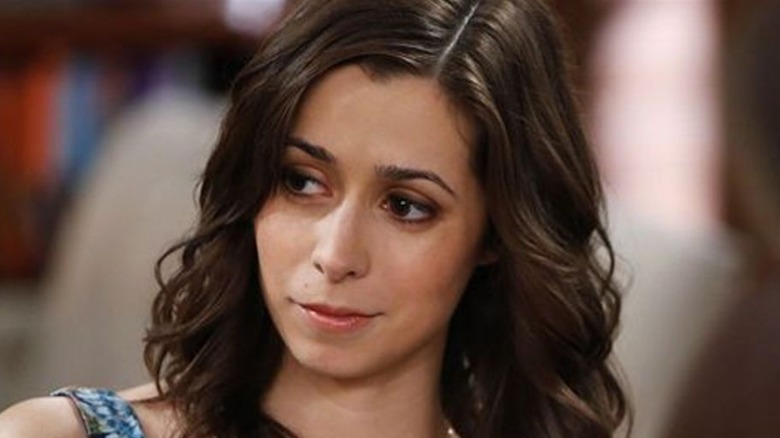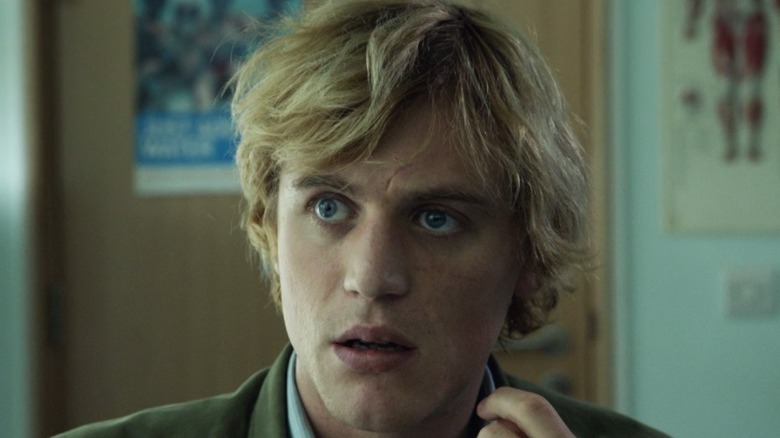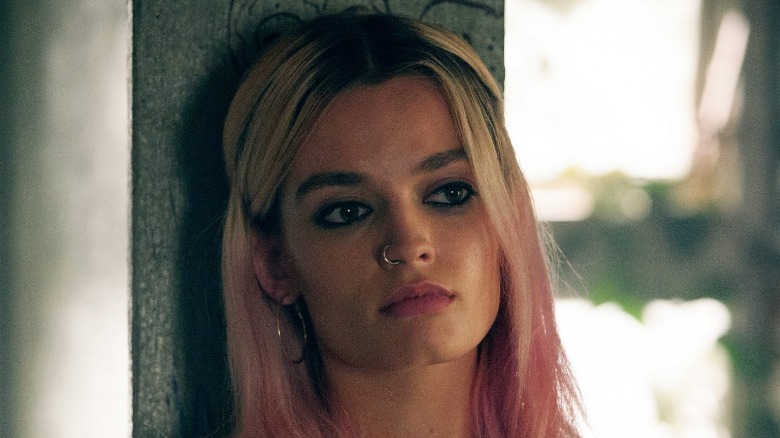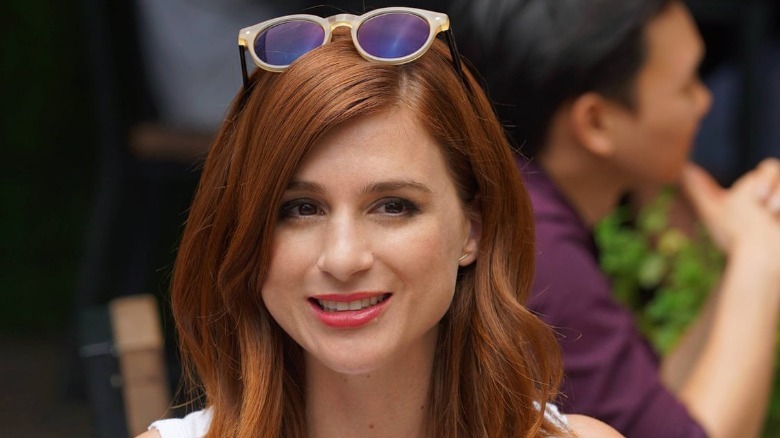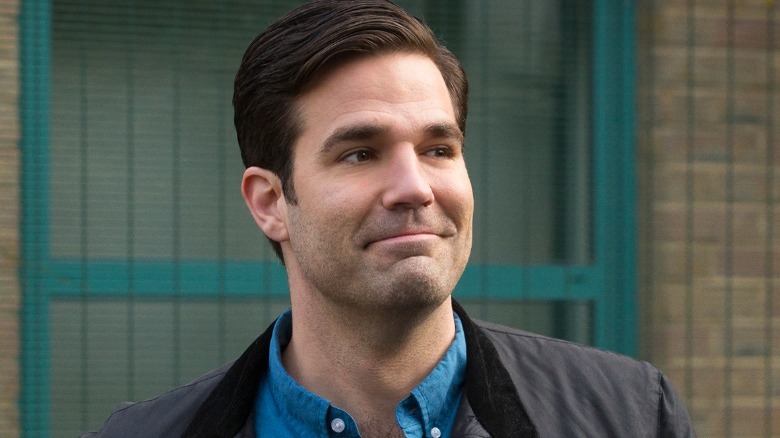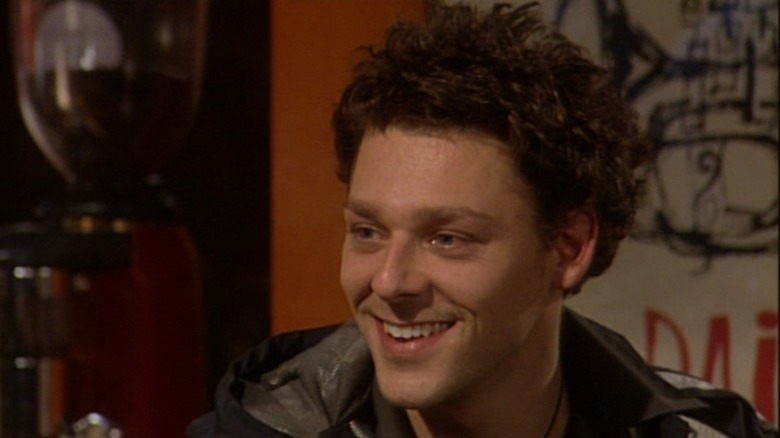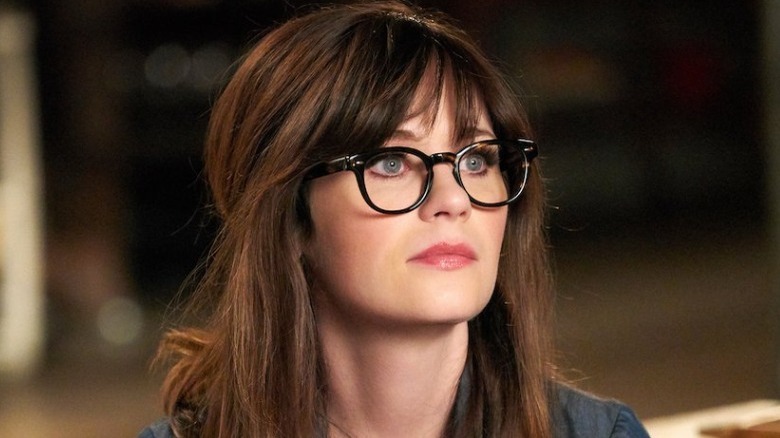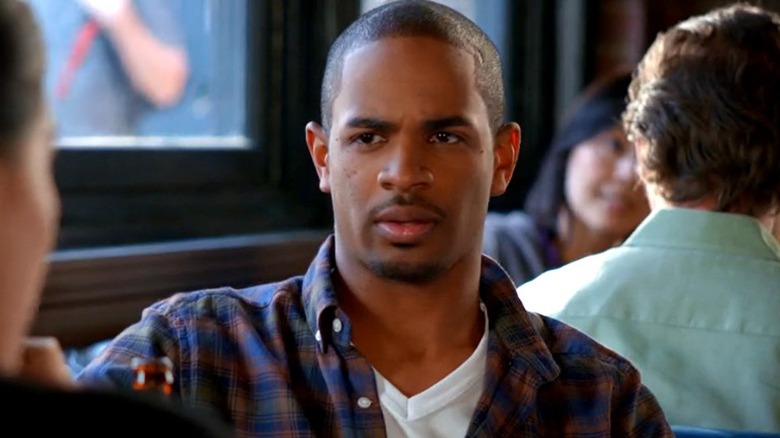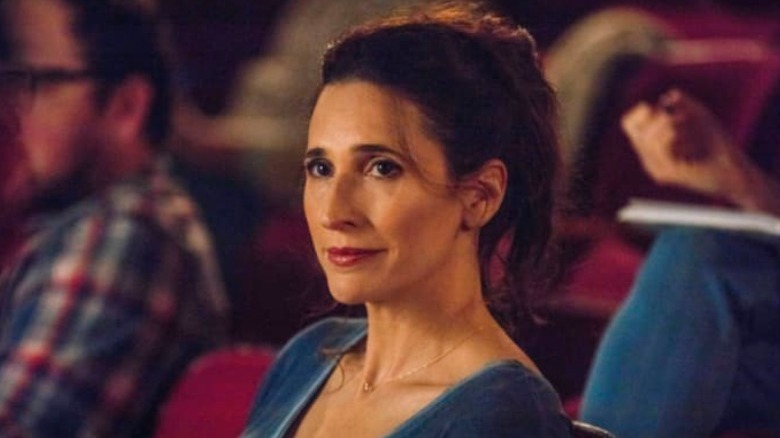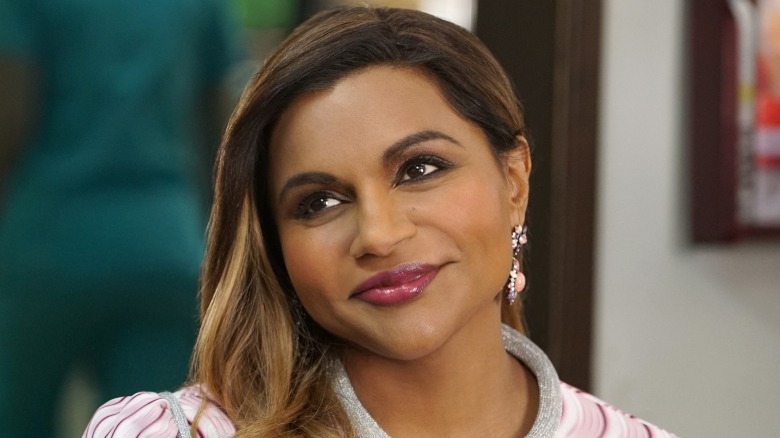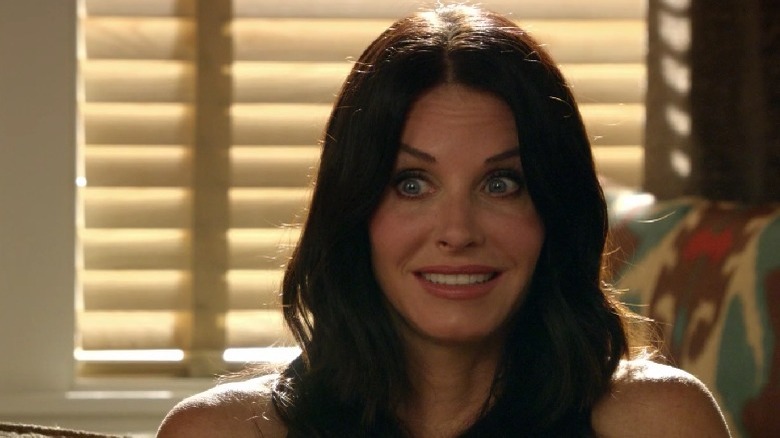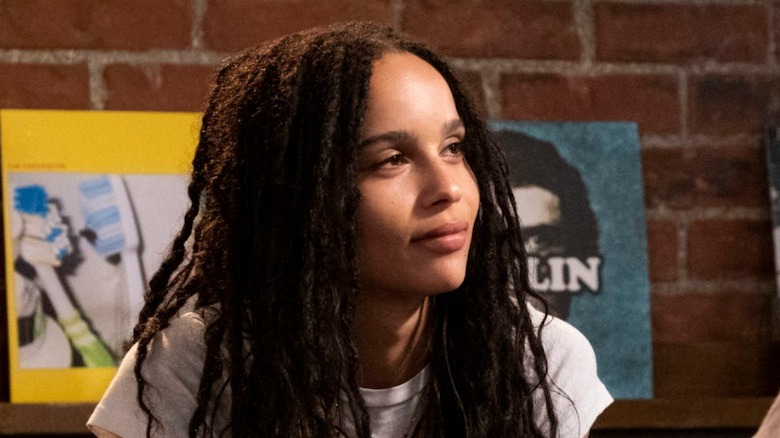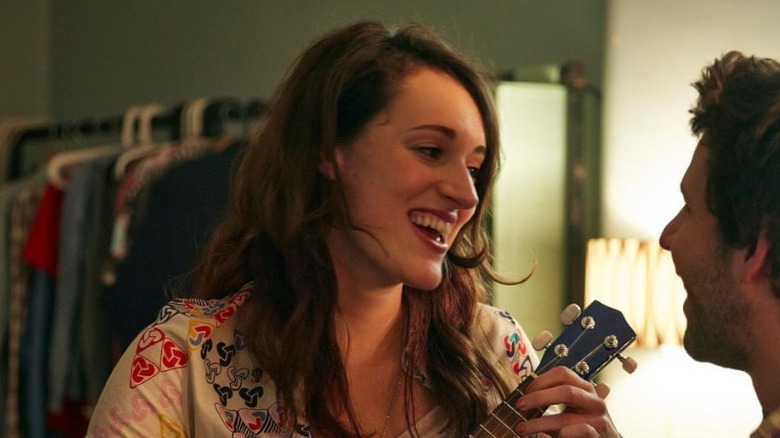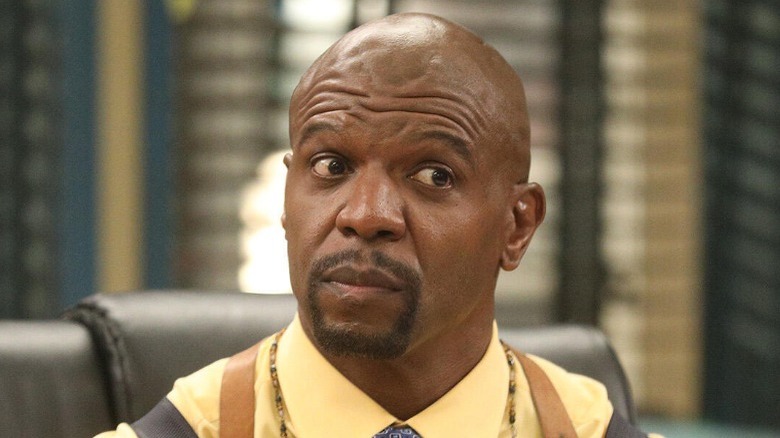Shows Like How I Met Your Mother That Romantic Sitcom Fans Need To See
It's hard not to miss "How I Met Your Mother" sometimes. Even though the ending left a sour taste with many fans, and almost every misogynist plotline involving Barney hasn't aged very well, "HIMYM" came along just a year after "Friends" ended and filled the same role in our lives for nine seasons. The chemistry of its leads gave the show a lived-in, authentic feeling. Unlike a lot of other sitcoms, these characters laughed at each others' jokes, giving you the sense that they actually liked and knew each other. Creators Carter Bays and Craig Thomas also did innovative things with plot and time, nestling several flashbacks within a single episode, or introducing multiple long-simmering Easter Eggs into the story (beyond just the titular mystery of the mother) to create a unique, memorable show.
So, while we wait with baited breath for the currently filming spinoff "How I Met Your Father" to make its way to Hulu, here are shows romantic sitcom fans need to see to re-capture some of that "How I Met Your Mother" feeling.
Lovesick
If flashbacks are your thing, the British show "Lovesick" takes them to even further heights than "How I Met Your Mother" ever managed. Main character Dylan, a very Ted-like romantic played charmingly by singer-songwriter Johnny Flynn, gets diagnosed with chlamydia and contacts old partners to tell them to get tested. Every episode centers around a flashback to a completely different point in time, eventually charting complex story arcs for Dylan and his two closest friends, Evie (Antonia Thomas as a Robin-esque detached love interest) and Luke (Daniel Ings essentially doing a Barney impression). Think of it as "Friends" with the structure of "Lost," but British.
Originally a Channel 4 production, Netflix produced the second and third seasons of "Lovesick," and also rescued the show from its unfortunate original title, "Scrotal Recall." (The first season is great, but the title made it hard to earnestly recommend to your friends.) Even star Antonia Thomas told Paste, "It's just so weird to feel proud about everything about the show but not wanting to talk about it because of the name!"
Sex Education
Even though a lot of the sexual humor on "How I Met Your Mother" is very dated from a post #MeToo sense, it was a show that was more sex-positive and frank about the role of sexuality in our lives than sitcoms that came before it. When you think about, the Ted narrating the show from 2030 was remarkably open in discussing his sex life with his teenage children — although not nearly as open as Dr. Jean Milburn on "Sex Education" is with her own son.
For three seasons, "Sex Education" has followed the students of repressed British secondary school Moordale as Dr. Milburn, expertly played by Gillian Anderson, passes on a frankness and openness about modern sexuality to her son Otis (Asa Butterfield) that slowly becomes revolutionary within the school. It's a show that's by turns hilarious and swoon-worthy romantic, combining a modern, progressive embrace of the complexity of sexuality with the same relationship mixing and matching that marked the DNA of its sitcom predecessors.
You're The Worst
"You're The Worst" is a show which hammers home that no matter how cynical or hard-wired against romance we may find ourselves, the pull of cliché and sappiness is right there in your face when you meet someone you get along with. Over five seasons, it charts less of a "will they/won't they?" and more of a "should they?" as it follows Jimmy (Chris Geere), a caustic British novelist, and Gretchen (Aya Cash), a selfish Los Angeles publicist. It captures the brunch-obsessed, kaleidoscopic feeling of LA timelessness as well as "How I Met Your Mother" conveyed what it's like to hop bars in downtown New York, and its misanthropy eventually gives way to a very "HIMYM" like sweetness, here and there.
"You're The Worst" told a realistic, compelling story of relationship dysfunction while also taking time to delve into the issues that can lie underneath, with episodes spotlighting clinical depression, therapy, and PTSD over the course of its run. In the final season, not to give anything away, creator Stephen Falk employs strategic flash-forwards to dangle questions about how "happily ever after" these complicated people can actually live, expertly using the expectations that shows like "How I Met Your Mother" have conditioned us for, to reveal surprising answers.
Catastrophe
"Catastrophe" is another show that's realistic, romantic, and can satisfy the desire to see what a relationship actually looks like after "How I Met Your Mother" spent nine years building up to the beginning of one. Co-created, co-written, and co-starring Rob Delaney and Sharon Horgan, "Catastrophe" tells the story of a couple that gets pregnant after a casual fling, and then decides to get married and get to know each other as they go along. It's honest, grimy in its detail about pregnancy and middle age, and downright hilarious as its two leads dissect and re-examine what's expected of a marriage in the modern age.
And if you enjoyed the litany of Star Wars references in "How I Met Your Mother," Carrie Fisher herself shines in a recurring role in "Catastrophe" as a hilariously disapproving mother, a role that would unfortunately be her last (or at least last non-CGI performance).
Coupling
One of the best parts of "How I Met Your Mother" was the way it created its own vocabulary for the recurring phenomena of dating life. Think of terms like "The Olive Theory," or "The Chain of Screaming," or the "Crazy/Hot Scale." Clearly drawn from the real lives of the creators, these now notable phrases reflected the way everyone becomes a philosopher of sorts when they're trying to puzzle out the mysteries of dating with their friends.
The BBC show "Coupling," (not to be confused with its swiftly cancelled American remake) actually perfected the art of this a few years before "How I Met Your Mother" premiered. Created by Stephen Moffat and based on his own life, "Coupling" was a "Friends"-like dating show about three men and three women, with one or two useful terms coined per episode by the hapless but knowledgeable Jeff (Richard Coyle). Theories ranged from being dating-specific like the "Sock Gap" (the moment between taking off your shoes and pants when you should remember to take off your socks, lest you be "a naked man in socks") to the more generally useful "Giggle Loop" (the moment when an inappropriate laugh, say at a funeral, gains too much steam between a group of friends and has to be let out).
New Girl
Something that "Friends" began to touch on in the '90s that "How I Met Your Mother" explored more in-depth during the 2000s was the shifting career paths of young adults, as the aimlessness of Generation X became the full-on ADHD life paths of Millennials. "New Girl" upped the ante even further when it premiered in 2011, depicting the lives of 30-somethings that still get wrecked playing drinking games, date around like teenagers, and generally have no idea what they're doing.
As the show quickly moved away from the premise that emphasized the cutesy persona of star Zooey Deschanel as the titular "New Girl" moving into a Los Angeles loft full of dudes, the show became an amiable hang-out sitcom that had a loose, semi-improvised vibe. It has enough relationship dramatics in the permutations among the main cast to satisfy your inner romantic, but it's as much about the quest for finding a fulfilling career and identity as it is about finding love.
Happy Endings
"Happy Endings" is a sitcom fan's sitcom, which is to say it's another standard look at the ins and outs of six young adults, various members of whom are in relationships with one another and such. But it also carries an absurd level of meta-awareness, and balances familiar sitcom beats and tropes with an almost cartoon-like tone. Most shows would make a joke about how Max (Adam Pally) "hibernates" during the Chicago winter like a bear and move on. "Happy Endings" has Max actually grunt and flail around like a bear for most of an episode.
While "How I Met Your Mother" has occasional fun with reality since it's all told in flashback ("Now kids, I swear this is how it happened"), "Happy Endings" exists in a full-on alternate sitcom-verse where potential boyfriends have names like "Doug Hitler," people get spontaneously slimed like on "You Can't Do That On Television," and generally anything can happen. For anyone that wants their "HIMYM" romance at a "30 Rock" joke delivery speed, this is the show for you.
Casual
One of the first notable original shows on Hulu back in 2015, "Casual" presented a modern look at the online dating trends that had become the way the majority of American couples met by the time "How I Met Your Mother" went off the air. Following a neurotic divorcee (Michaela Watkins), her cynical brother (Tommy Dewey), and her teenage daughter (Tara Lynne Barr), "Casual" used a multi-generational approach to come at dating through a multi-faceted lens.
In the fourth and final season, the story jumps four years into the future to add some science fiction speculation to what online dating might yet bring. A digital assistant named "Ova" gets a little too involved in everyone's personal lives, and people go on virtual reality dates beset by pop-up ads blaring at them. "How I Met Your Mother," which is technically set in the year 2030 when Ted is telling the story to his kids, missed a real opportunity to give us a glimpse of what the future could be like. "Casual" is here to scratch that itch.
The Mindy Project
Firmly in the Ted Mosby tradition of hopelessly romantic sitcom leads, Mindy Lahiri on "The Mindy Project" was even more explicit in her desire to live in a movie like "When Harry Met Sally." The first few seasons of Mindy Kaling's show functioned as a sort of hybrid workplace comedy centered on her main character's OB-GYN practice and rom-com about her various relationship travails, mostly with friend and banter-mate Danny (a breakout role for Chris Messina). The show's tone smartly allowed for homages to many famous rom-coms, like the Season 2 finale "Danny and Mindy" which has a very "You've Got Mail" plot.
But when the show jumped from Fox to Hulu in Season 4, Kaling and her co-writers decided to go all-in and have entire episodes with fantastic, movie-like premises. There's a "Groundhog Day" time loop episode ("Hot Mess Time Machine"), a "Sliding Doors" rumination on fate ("While I Was Sleeping"), and even a body-swap episode — although you might guess from the title "Mindy Lahiri is a White Man" that it has more to do with racial privilege than romance. If you need something as gleefully playful as "How I Met You Mother" that still has its heart on its sleeve, "The Mindy Project" has 117 episodes that are right up your alley.
Cougar Town
"Cougar Town," like many other shows that outgrew their initial premise, is a show you have to look past the title and original gimmick of to appreciate. Yes, it began as a vehicle for "Friends" star Courtney Cox to play Jules, a randy Florida realtor on the prowl for younger men. And yes, she appeared in print ads and the DVD cover wearing a shirt that says "40 is the new 20." But before the first season ended, the show had left the younger men hook well behind, paired Jules off with her age-appropriate neighbor, and become an entirely different show. When the second season started, the writers added a subtitle to each episode's title card mocking how bad a fit the name had become, though they never quite changed it.
A hangout show to end all hangout shows, "Cougar Town" leaned into the eccentricities of its cast and Florida setting, and became a meditation on the bonds of friendship in middle-aged adulthood. It focuses in on the minutiae of life in the suburbs, as largely plotless episodes see the group of friends known as the "Cul De Sac Crew" drinking copious amounts of wine and playing a game where you toss pennies into a can (aptly named "Penny Can"). It's easy to imagine this is the sort of eccentric routine the "How I Met Your Mother" gang got into in their later years.
High Fidelity
The most unique thing about "How I Met Your Mother" was the framing device of Future Ted, narrating and illuminating the events we see for his audience. And if that feint around the fourth wall is too subtle for you, you can skip right to "High Fidelity," as the protagonist of both the 2000 John Cusack movie and the 2020 TV remake starring Zoë Kravitz talks directly to you through the camera. Despite moving the setting from Chicago to Brooklyn, changing the gender of the main character and several others, and 20 years passing it's actually a pretty faithful adaption of the original film.
Just like Cusack's Rob Gordon, Kravitz's Robyn "Rob" Brooks owns a record shop and a heart that's been broken several times over, and she wonders out loud to the audience where it all went wrong. "High Fidelity" the show works on its own merits due to the strength of Kravitz and the rest of the cast, and works double as nostalgia for the movie if you grew up loving that as well. It's sort of a game to see the gender and generationally-swapped version of the soundtrack, and other specific flourishes — instead of Bruce Springsteen appearing in male Rob's imagination, female Rob is encouraged to dig through her past by a vision of Debbie Harry.
Crashing
Before Phoebe Waller-Bridge launched herself to international stardom with both seasons of the award-winning "Fleabag," she wrote and starred in the miniseries "Crashing," a story about six London 20-somethings that any "How I Met Your Mother" fan would love. Heartbreakingly, there are only 6 episodes, but such are the British ways of doing things. Waller-Bridge manages to cram multiple seasons worth of plot and sexual tension into the short series about "property guardians," people that pay cheap rent to property owners that want to avoid squatters while they decide what to do with it — in "Crashing" they all live in an abandoned hospital.
All of the timing, vulnerability, and cheekiness that would make "Fleabag" so endearing are clearly present in "Crashing." In particular, Waller-Bridge and her costars Adrien Scarborough and Louise Ford play the sides of a convincing love triangle with no clear villain, and the characters generally feel complex in a way that's rare for sitcoms that have hundreds of episodes to work with.
Brooklyn Nine-Nine
"Brooklyn Nine-Nine" might seems like a strange choice at first, since it's primarily a workplace sitcom, about the police no less. But if you've rewatched "How I Met Your Mother" recently and want to see more characters that seem like real friends, jokes that are rooted in a deep collective history, and get a sense of New York then look no further. Recently wrapping up its eighth and final season, "Brooklyn Nine-Nine" started as a wacky take on police work but evolved into a show with real heart, and a real sense of romance in its handling of the show's central couple, Andy Samberg's Jake Peralta and Melissa Fumero's Amy Santiago.
As a bonus, both shows have a real soft spot for Halloween, but instead of Ted's somewhat repetitive quest to find "The Slutty Pumpkin" again, "Brooklyn Nine-Nine" puts other sitcom Halloween episodes to shame with elaborate heist episodes that get crazier and crazier every season. The Halloween Heists are an annual bit of zaniness on a show that feels surprisingly down to earth and compelling.
